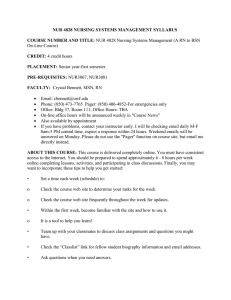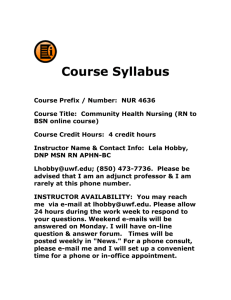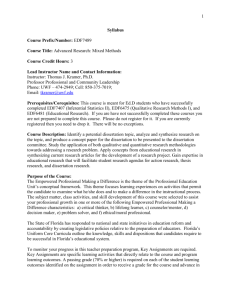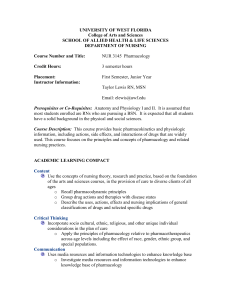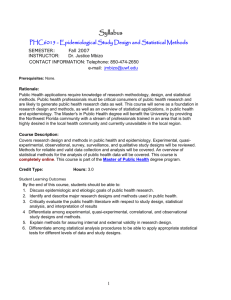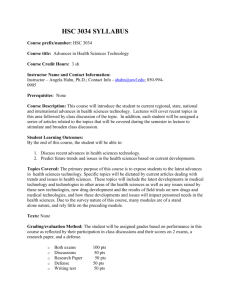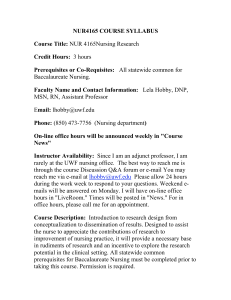THE UNIVERSITY OF WEST FLORIDA COLLEGE OF ARTS AND
advertisement
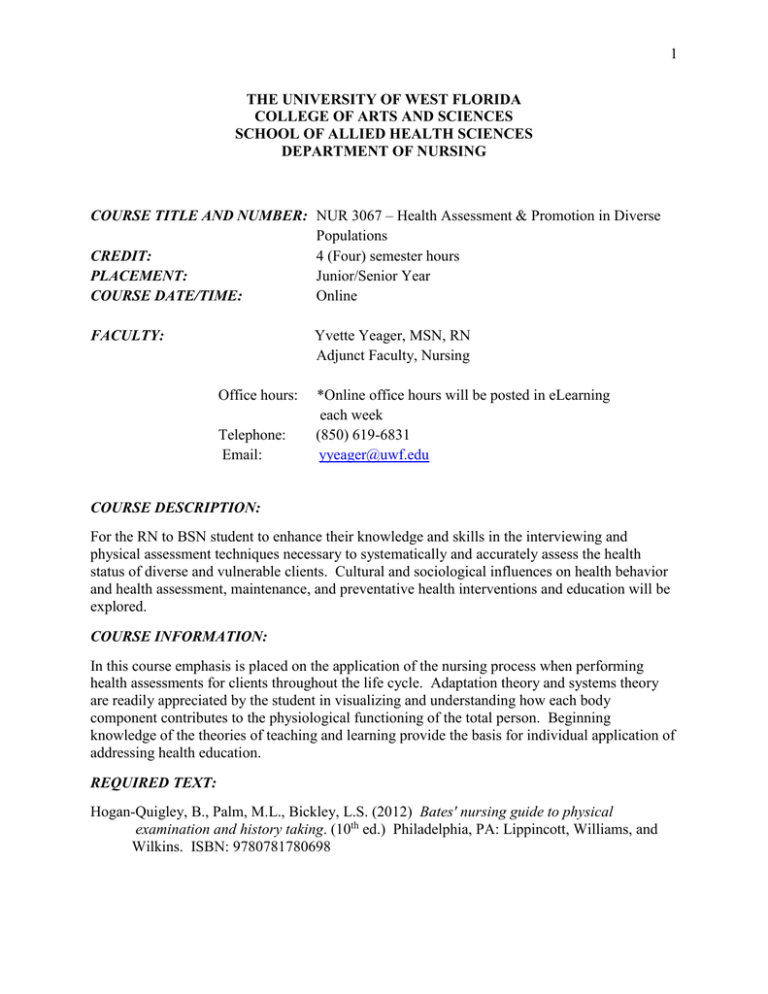
1 THE UNIVERSITY OF WEST FLORIDA COLLEGE OF ARTS AND SCIENCES SCHOOL OF ALLIED HEALTH SCIENCES DEPARTMENT OF NURSING COURSE TITLE AND NUMBER: NUR 3067 – Health Assessment & Promotion in Diverse Populations CREDIT: 4 (Four) semester hours PLACEMENT: Junior/Senior Year COURSE DATE/TIME: Online FACULTY: Yvette Yeager, MSN, RN Adjunct Faculty, Nursing Office hours: Telephone: Email: *Online office hours will be posted in eLearning each week (850) 619-6831 yyeager@uwf.edu COURSE DESCRIPTION: For the RN to BSN student to enhance their knowledge and skills in the interviewing and physical assessment techniques necessary to systematically and accurately assess the health status of diverse and vulnerable clients. Cultural and sociological influences on health behavior and health assessment, maintenance, and preventative health interventions and education will be explored. COURSE INFORMATION: In this course emphasis is placed on the application of the nursing process when performing health assessments for clients throughout the life cycle. Adaptation theory and systems theory are readily appreciated by the student in visualizing and understanding how each body component contributes to the physiological functioning of the total person. Beginning knowledge of the theories of teaching and learning provide the basis for individual application of addressing health education. REQUIRED TEXT: Hogan-Quigley, B., Palm, M.L., Bickley, L.S. (2012) Bates' nursing guide to physical examination and history taking. (10th ed.) Philadelphia, PA: Lippincott, Williams, and Wilkins. ISBN: 9780781780698 2 REFERENCE FORMAT FOR WRITTEN WORK: American Psychological Association. (2010). Publication manual of the American Psychological Association, 6th Ed. Washington, DC: The Association. ISBN: 978-1-4338-0562-2 While the nature of the written work in this course is not one of formal papers, it is expected that the student provide evidence based rationale from scholarly sources and that all citations and references are to follow APA guidelines. References used in the development and presentation of written work should have been published within the previous five (5) year period. Research in the health sciences is very active and, therefore, only the most recent work is to be used. Papers using Wikipedia as a reference will receive a grade of zero. Note: It is recommended the student keep a clean copy of all work submitted. Instructor feedback on written work will be within two weeks of the posted due date for the assignment, sooner if possible. It is strongly recommended that student retain a copy of the email that is received confirming the assignment has been submitted to the Dropbox., and also a copy of work submitted. Do not email an assignment to instructor. Assignments must be submitted to the appropriate Dropbox to be reviewed, evaluated, and graded. Papers are due in the Drop Box on the date & time specified. The Dropbox will automatically close at the announced due date and time, and will not be accessible after that time. Exception to the due date and time will be made only under extraordinary circumstances in the opinion of the faculty member, and must be negotiated before the paper is due. REQUIRED EQUIPMENT: 1. Stethoscope of good quality; both diaphragm and bell head capacity 2. Internet access to student resources on publisher’s website ACADEMIC LEARNING COMPACT: Upon successful completion of this course the student will be able to: I. CONTENT A. Use the concepts of nursing theory, research and practice, based on the foundation of the arts and sciences courses, in the provision of care to diverse clients of all ages Utilize techniques of inspection, auscultation, percussion, and palpation. 3 B. Describe and use appropriate teaching-learning theories to design, implement, and evaluate educational experiences with clients of all ages and abilities Employ teaching-learning strategies during client interactions. II. CRITICAL THINKING A. Use effective critical thinking skills (e.g., observation, analysis, synthesis) through the nursing process to provide and direct quality care to diverse clients of all ages B. Identify appropriate methods of data collection in assessing the client’s health status and formulating a nursing diagnosis. Demonstrate the process of assessment to determine the client’s level of wellness. Obtain a complete health history from clients of different developmental states. Integrate appropriate physical assessment techniques when performing health assessment. Incorporate socio-cultural, ethnic, religious, and other unique individual considerations in the plan of care Identify relevant developmental considerations of the mental status examination. Obtain a complete health history from clients of different developmental states. III. COMMUNICATION A. Uses media resources and information technologies to enhance knowledge base Conduct a basic health history, including recognition of genetic risks and environmental exposure to identify current and future health problems. Demonstrate the ability to elicit a minimum of three generation family health history information Compare and contrast expressions of behaviors of health and illness among clients of different cultures when performing health assessments. IV. INTEGRITY/VALUES A. Demonstrate accountability, responsibility, authority, and professionalism based on the American Nurses Association Code of Ethics in own professional nursing practice Relate the nursing responsibilities for health and physical assessment to prepare for conducting the examination. Adhere to ANA Standards of Clinical Nursing Practice Discusses responsibility for involving clients in development of plan for health promotion. 4 V. PROJECT MANAGEMENT The Project Management learning domain in nursing is organized into four categories with related student learning outcomes. The four broad categories with associated specific student learning outcomes are: A. Project Conceptualization 1. Integrates discipline concepts, resources, and research appropriately Describe evidence-based practices that guide health teaching, health counseling, screening, outreach, referral, and follow-up for patients throughout the life span. GRADED COURSE WORK: Quizzes (5) (20pt. ea) Health History Interview 3 Generation Family Health Genogram Nursing Diagnosis and Client Teaching Nutritional Assessment Evaluation of Physical Exam by Healthcare provider and Final Completed Health Assessment (25pts. ea) Health Assessment with Narrative Documentation (3) (20pts. ea) Discussions (5) (4pts. ea) MMSE Case Study Total 100 20 10 20 10 50 60 20 10 300 Grading Scale (%): Divide your points by possible points (300) and multiply times 100 to get percentage. A AB+ B B- 93-100 90-92 87-89 83-86 80-82 C+ C CD+ D 77-79 73-76 70-72* 67-69* 63-66* D60-62* F < 60* *Constitutes a failure in this course. Satisfactory completion of the course is based on satisfactory achievement of course student learning outcomes. The student who fails to meet the course student learning outcomes must repeat the course in its entirety. SPECIAL TECHNOLOGY UTILIZED BY STUDENTS: This course is being offered fully and completely online. Each student is required to: 1. Have reliable Internet access 5 2. 3. 4. 5. 6. Log on to the course two to three times per week for news updates and course participation Check and use the UWF student email account for all correspondence Have downloaded Adobe Acrobat Reader for PDF file utilization Desire2Learn (d2L) understanding and familiarization is a must. Threaded discussions, drop box utilization, quiz/testing, course content, links, and assignments are all here. Access online library for scholarly resources UNIVERSITY POLICY ON ACADEMIC CONDUCT: The Student Code of Conduct sets forth the rules, regulations, and expected behavior of students enrolled at the University of West Florida. Violations of any rules, regulations, or behavioral expectations may result in a charge of violating the Student Code of Conduct. It is the student’s responsibility to read the Student Code of Conduct and conduct themselves accordingly. You may access the current Student Code of Conduct at http://www.uwf.edu/judicialaffairs this site also houses the new Academic Misconduct Policy that went into effect on August 19, 2009. A student determined to be cheating on NUR3067 exams or assignments will be given a “0” (zero). The incident will be documented and reported to the Program Director. PLAGIARISM POLICY: Plagiarism is defined by the university as “the act of representing the ideas, words, creations, or work of another as one’s own.” Should a student be found plagiarizing in a paper, nursing care plan, or log, the student will be reported by the faculty member to the Director of the Nursing Program and follow the process described in the university’s Student Life handbook. Plagiarism is a serious offense in academia and may result in expulsion from the university. (UWF Student Life Handbook). Students are directed to the examples available in the Pace library, and are encouraged to complete the tutorial available at http://library.uwf.edu/Tutorials/module_plagiarism/default.htm . UWF maintains a university license agreement for an online text matching service called TurnItIn. The instructor may use the TurnItIn service to determine the originality of student papers. If the instructor submits your paper to TurnItIn, it will be stored in a TurnItIn database for as long as the service remains in existence. If you object to this storage of your paper: 1. You must notify the instructor no later than two weeks after the start of this class (October 30, 2013). 6 2. The instructor will utilize other services and techniques to evaluate your work for evidence of appropriate authorship practices. For complete information regarding Academic Misconduct, refer to the UWF Student Handbook or contact Student Affairs in Building 21, 474-2384. ASSISTANCE FOR STUDENTS WITH SPECIAL NEEDS: The Student Disability Resource Center (SDRC) at the University of West Florida supports an inclusive learning environment for all students. If there are aspects of the instruction or design of this course that hinder your full participation, such as time-limited exams, inaccessible web content, or the use of non-captioned videos and podcasts, please notify the instructor or the SDRC as soon as possible. You may contact the SDRC office by e-mail at sdrc@uwf.edu or by phone at (850) 474-2387. Appropriate academic accommodations will be determined based on the documented needs of the individual. Accommodations cannot be instituted until registration with the SDRC office has been completed, and are not retroactive ONLINE QUIZ/TEST TAKING GUIDELINES--IMPORTANT INFORMATION: Please do not begin any timed, online exams/quizzes in the course that may overlap with eLearning maintenance window. The eLearning maintenance window runs 3:00-6:00am CST (Central Standard Time) each day. If you initiate an exam that overlaps with the eLearning maintenance times and experience technical difficulties, your score may not translate accurately and may be lost all together resulting in a grade of zero, “0” for the assignment. There are no exceptions to this policy. If you experience any other technical problems or errors during any timed exam/quiz, you are to notify your instructor via email immediately and then notify the helpdesk at helpdesk@uwf.edu or (850) 474-2075. Failure to contact the Help Desk for any technical problems will result in a grade of zero, "0" for the assignment.. If you are unable to get immediate assistance from the Help Desk during the exam or assignment attempts, but have documented the problem in an email or voice mail, you may attempt to restart the exam using the same browser, or attempt to re-enter the exam with another browser. If you are still unable to restart the exam and continue with saving, please note that for your final submitted score to be recorded, you must still prove that you documented the original technical problem with the Help Desk via email or phone. Failure to do so will result in an automatic grade of zero, "0" being assigned. COMMUNICATIONS TO INSTRUCTOR: Communications to instructor may be completed in several different ways. 1. Post question to “Ask Your Instructor” discussion board. 2. If necessary, direct e-mail to instructor – yyeager@uwf.edu 3. Telephone – (850) 619-6831 In all cases, I will respond to questions within three business days. 7 When sending an E-mail message to instructor, please be sure that the words in the Subject line reflect the subject of the message. To merely "reply" to a previous message and then type in a new message without changing the words in the subject line suggests lack of concern about the topic of the new message. Please take the time to edit and change the words in the subject line (use the “Edit Subject” function on the email screen). I frequently bundle E-mail with the same subject into one E-mail box, and read them together on a particular day. If the subject line does not reflect the content of your message, the message might not be read as soon as you had anticipated. The best approach is to include: “NUR3067 – question regarding _______; Student Name.” This information in the subject line will ensure that your message will be noted appropriately. HEALTH INSURANCE PORTABILITY & ACCOUNTABILITY ACT OF 1996 (HIPAA) All healthcare providers must comply with the federal regulations of this Act. It requires that identifiable patient information be disclosed on a need to know basis with a minimal amount of disclosure to perform a task. The patient’s consent for treatment covers access to the medical record for information needed for treatment purposes and educational purposes. All students will protect patient privacy during oral and written communications. Patient name, initials, address, phone/fax numbers, and social security number will be removed from all student assignments. Students may not copy or circulate papers containing private, confidential patient information. Faculty members will store confidential papers in a locked file or will shred confidential papers. Additionally, students will meet all mandated agency requirements for HIPAA. Since HIPAA is a federal law; violations may result in fines &/or imprisonment. Within this course, students are interacting with clients. The names of individuals examined are not to be disclosed within the paper submitted for the assignment (only use initials). ACKNOWLEDGEMENT OF COURSE EXPECTATIONS Please read the syllabus and all course information and instructions. Afterward, copy and paste the following statement into a blank document, type your name and date, save the document in Word or rtf, and submit to the course Dropbox titled Course Expectations. Please submit this acknowledgement no later than 11:59PM, October 30, 2013. I have read, understand, and accept the course Syllabus and course requirements herein, have printed/saved them and the syllabus for future reference; explored all materials posted in eLearning for this course; read, understand, and accept the syllabus, assignment requirements and deadlines, discussion posting requirements and deadlines, grading, course deadlines, late policies, incomplete policy, academic honesty policy, and course semester project requirements. I will contact UWF ITS Helpdesk for tech issues. I will review the updates, discussion area, and general course room several times per week and regularly. I have all of the required materials for the course. I understand that assignments may not be emailed or faxed to the instructor. I understand when the Final Completed Assessment and Skill Check-off are due, it must be submitted to the appropriate dropbox, and that it will not be accepted or graded after the 8 deadline of December 6, 2013, 11:59PM. I understand that the Skill Check-off must be signed by an ARNP or MD failure to comply will result in a grade of zero. Your name: ____________________________ Date_________________________
